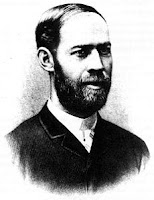 |
| Heinrich Hertz (1857-1894) |
Heinrich Hertz (1857-1894) was a noted German physicist. As a student at Berlin in 1880 he came under the influence of Helmholtz, which determined his later career. His work while here on the inertia exhibited by electricity was especially creditable. Two years were spent as a lecturer in physics at Kiel, then four years at Carlsruhe, when, in 1889, he became professor of physics at the University of Bonn. The year previous Hertz made known his immortal work on the relation between light and electricity which had been prophesied by Maxwell in his interpretation of the work of Faraday. In this Hertz demonstrated that electricity can be transmitted in electromagnetic waves with approximately the same velocity as light waves. This production and detection of electromagnetic waves by Hertz was the beginning of that experimentation which gave us wireless telegraphy and other electric wave phenomena.
The hertz (Hz) was established in Hertz's honor in 1930 as a unit of measurement for frequency, a measurement of the number of times that a repeated event occurs per unit of time (also called "cycles per sec").